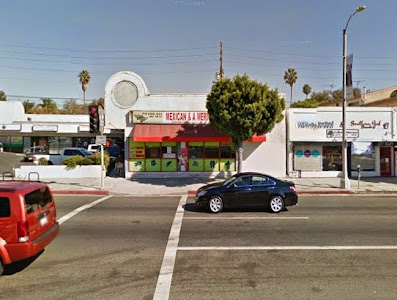 |
| The logo for Libra Press. |
 |
| Original artwork for "Superfruit." |
As Joe Blevins noted in his review of Ed Wood's short story, "Superfruit," the address, the presence of Ed's fiction, and the layout and design of the magazines are all dead giveaways that Libra was yet another Pendulum-related publication. Curiously, unlike now-better-known-and-documented imprints, including Pendulum, Calga, Gallery Press, SECS Press, and Edusex, no Libra titles appear to have been filed for copyright in the first half of the '70s. Hence, the full extent of Libra Press titles is hard to pin down. Only a handful of issues appear to be floating through the hands of collectors and sellers, but those suggest a span, as early as 1970 through 1976, covering the majority of time the other magazines imprints were published.
"Superfruit," credited under Wood's own name, originally appeared in Meatrack, a gay-themed Libra publication, in its first issue from 1971. Another Ed-penned piece titled "The Gay Suburbanite" appeared, without credit, in that same issue. The review of "Superfruit" linked above originally indicated that the story had appeared in Luscious. Upon further inspection, the editorial contents page for Luscious (featuring Neola Graf, aka Malta) mistakenly appeared in Meatrack. This was likely a printing error in the fast and loose world of Pendulum, where material was oft-times recycled. That page makes it clear that Luscious was heterosexual in orientation, and the level of detail suggests a complete magazine we've yet to locate. Beyond that title, we know the following Libra issues did exist, with contents as noted when known:
- Meatrack - Book One - 1971 - Includes "Superfruit" and "The Gay Suburbanite," both by Ed.
- Sex Affairs - Book Two - 1970s (cover price suggests '75-'76) - Includes pictorials with uncredited text: "Two on a Couch"; "Therapeutic Fantasy"; "The Magic Carpet"; "The No-Tell Motel"; and "The Juggler, Conclusion of a Two-Part Erotic Tale" by Garth Prawn. Part one presumably appeared in book one of this same title.
- Whiplash - Book One - 1970's (cover price suggests '75-'76) - Includes Ed's short fiction "You Gotta Have a Fetish, You Gotta Have a Gimmick" (under the pseudonym Ann Gora) and two uncredited articles on fetishism and public perception.
- Illustrated Incest Case Histories - Book One - 1976 - "Case Histories: All in the Family"; "Mrs. Jefferson and Selma"; "Mrs. Jefferson and Pete"; "Pete and Selma." Articles: "The Stigma of Incest"; "Incestuous Fantasies."
- Love & Sex - Book One - 1976 - Articles/pictorials with uncredited text: "Sexual Mores and Sexual Behavior"; "Tips on Intercourse"; "Sex and the Common Object"; "How Much and How Often?"; "The American Bosom Madness"
We hope this is a starting point for exploration of terrain where more of Ed's work will appear. The eagle-eyed Woodologist should note that some magazines from the Pendulum family carried the address of 5583 W Pico. Leo Eaton, a fellow staffer of Ed's in the Pendulum office, recently explained to me the office layout, delineating numerous office suites that account for the multiple addresses: "The writer's offices were separated from the art department by a door that was on an an electric lock. You came into the building through a back entrance in the parking lot, clocked in (yes, we all had time cards), and the writers turned left while the artists turned right. The executives went in through the front door on W Pico."
The Libra Press logo was, fittingly, the scales. Librans are ruled by Venus, but at Libra Press, love was merely synonymous with sex. Despite generally possessing balance and harmony, Libran men can be reckless gamblers, and while typically easygoing, Librans can shock with storms of rage. They can be fussy over their appearance. Their most suitable professions include artists, writers and actors.
Born October 10, 1924, Ed was, perhaps not coincidentally, a Libra.
Special thanks to Bob Blackburn, for the cover and information regarding Meatrack, and to Leo Eaton, for providing priceless real-world details of the Pendulum magazine office.
BONUS: Enjoy some vintage Libra Press covers and an uncensored version of that Luscious contents page at the Ed Wood Wednesdays Tumblr right here.
BONUS: Enjoy some vintage Libra Press covers and an uncensored version of that Luscious contents page at the Ed Wood Wednesdays Tumblr right here.



